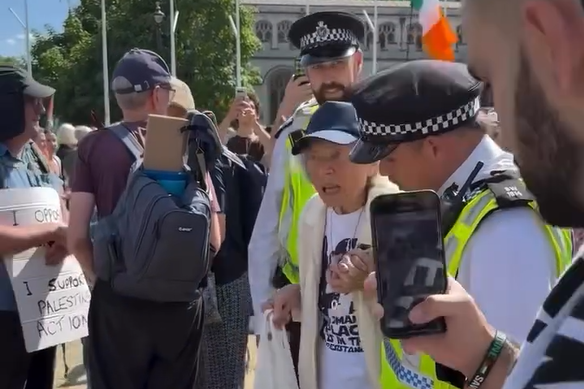THE ARREST under terrorism legislation of an 80-year-old Aberystwyth woman protesting peacefully over the Gaza genocide, and a spot of bother at Warwickshire County Council, are not disconnected.
Elizabeth Morley, a 1950s refugee from Soviet-occupied Hungary, was held at a demonstration in central London earlier this month after, she said later, holding a placard that read : ‘I oppose genocide. I support Palestine Action.’
Her arrest, along with 531 others - half, according to police figures, aged 60 or above - followed a 385-26 Commons vote last month to ban the direct action group as a terrorist organisation, despite concerns that the move posed a grave risk of criminalising legitimate peaceful protest. The legislation - an amendment of the Terrorism Act 2000 - outlaws not only members of Palestine Action but anyone showing support for it, and carries prison sentences of up to 14 years.
Among those arrested was Sir Jonathon Porritt, 75, a former government adviser who said he had long been concerned about the erosion of civil liberties under successive governments. He described the proscription of Palestine Action as “a measure of the government’s desperation” and “entirely inappropriate”.
In Warwickshire, meanwhile, drama of a different kind was being played out - at one end of a thread linking local government in Shakespeare land and Elizabeth Morley and fellow protesters in London.
In Stratford-upon-Avon, the council’s new leader, the Reform party’s Rob Howard, a 68-year-old retired businessman, failed to show up for the first full council meeting because he was on holiday in the Dominican Republic.
He later divulged to the Stratford-upon-Avon Herald that another tricky absence was - no surprise here - policies. “I’ll be honest with you”, he told the paper, as if this was perhaps a new experience, “it’s going to be difficult to be very specific about that. So I prefer not to actually talk about policies specifically.”
Thus, home secretary Yvette Cooper, using her powers to crush dissenting voices outraged over Israeli government criminality in Gaza, criminalises peaceful protest in a context of being afraid that otherwise she and the government would be slagged off as flabby by Nigel Farage. He, the empty vessel with clanging sound-effects Keir Starmer and friends so deeply fear could be the next PM.
The consequence of their panic is that Reform, a party without substance, characterised by wobbly-minded, high volume populist slogan-slingers, is already, four years before the next general election, directing in significant ways the slant of the Starmer government, having already chalked up inroads into local and regional government.
It’s also true, of course, that the kind of authoritarianism which permits criminalisation of peaceful protest is well represented in Starmer’s administration, and it’s unlikely that influential Labour right-wingers will not have played their part in steering Yvette Cooper in the undemocratic direction she settled on.
A detail here is hard to resist, which is that, the week before the Terrorism Act amendment hit the Commons, the home secretary, with a large number of other women Labour MPs, took part in a photoshoot celebrating the suffragettes, who between 1912 and 1914 ran a bombing and arson campaign as part of their struggle for women’s right to vote. They posed proudly for pictures with suffragette-style sashes then, most of them, voted to classify as a terrorist organisation a movement which positions itself as opposing violence against people. Do they believe hypocrisy is not retrospective?
The deeper background to all this, however, is the power of wall-to-wall social media and sundry news-feeds to sap people’s capacity for critical analysis and response to governmental authoritarianism. To the extent that digital white noise and trivia crash unremittingly into our head-space, our ability to distinguish the wheat from the chaff can become commensurably harder.
The last word should go to Elizabeth Morley. Writing in The Guardian, with others, in May 2023, on erosions of the right to protest, she recalled: “In 1957, when as an 11-year-old I arrived with my parents in this country to find safe haven as refugees from Soviet-occupied Hungary, the sight of a friendly bobby on street corners taught me to not be afraid of authority.
“Today, at the age of 78, having never knowingly committed a single law infringement in my life, I nevertheless have to fear being arrested if I as much as take part in a peaceful demonstration. My parents would turn in their graves.”
So much for a right of reply...
A TIMELY red flag hoisted by the nation.cymru website over Nigel Farage’s eccentric notion that we’d be better off filling Westminster government cabinets with unelected appointees from business and industry rather than with moth-eaten MPs.
But then this otherwise sensible, though unsigned, opinion piece blows itself apart by describing Farage’s proposal as “the greatest subversion of parliamentary democracy since the introduction of universal suffrage in 1928, when women were granted equal voting rights to men.”
The question arises: how can votes for women be seen as a subversion - that is, an undermining - of parliamentary democracy and not as an enormous strengthening of it?
Will nation.cymru’s followers bridle at this solidarity with stone age sensibilities?
There’s no sign from plentiful comments under the piece that they’re of other than the same opinion, so I put the “subversion” point in a comment of my own. It isn’t used. I resubmit. No luck. The website must be against right-of-reply as well as votes for women.





Comments
This article has no comments yet. Be the first to leave a comment.